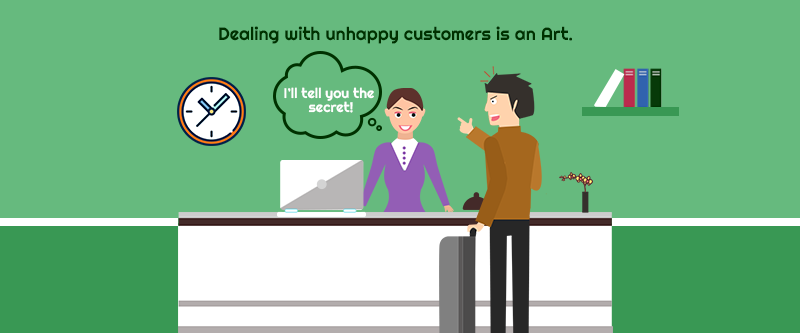How to Manage Hotel Guest Complaints and Deal with Unhappy Guests

In the hospitality industry, providing exceptional service is essential. While customer satisfaction is the goal, challenges arise when you have to deal with unhappy guests and their complaints. One bad experience can make customers turn to the competition. Here’s how to effectively manage complaints while maintaining your hotel’s reputation.
Table of contents
- What are the most common guest complaints in hotels?
- How to Deal with Unhappy Guests and Their Complaints in a Hotel?
- Apologize
- Care to listen
- Avoid arguments
- Make sure your body language is not aggressive
- Empathize and acknowledge their frustrations
- Never pass on the guest to another department
- Comfort with best offerings
- Avoid taking things personally
- Come up with a conclusion
- Thank the guest for bringing the matter to light
What are the most common guest complaints in hotels?
Understanding common complaints can help you to be better prepared for interactions with unhappy guests. Here are some common problems:
1. Poor Customer Service
Poor service is one of the most common complaints. Every member of staff, from receptionists to cleaning staff, needs to be well trained and attentive. A single service problem can drive customers to choose a competitor.
A customer is 4 times more likely to defect to a competitor if the problem is service-related than price or product-related.
2. Dirty Rooms
Whether it’s a budget hotel or a luxury establishment, unclean rooms can frustrate guests. Make sure that cleaning staff are diligent and that information on room availability is communicated to guests.
3. Low Food Quality
Quality food is essential. Complaints about the taste or temperature of food must be dealt with quickly by the kitchen team.
4. Foul Smell
Unpleasant odours can put customers off. Regular cleaning routines and frequent follow-ups can help prevent these complaints.
5. Unfriendly Staff
Customers expect polite interactions. Train staff to remain courteous, even in difficult situations.
6. Malfunctioned or Damaged Electronics
Guests often use electronic devices during their stay. Responding quickly to any equipment problems is crucial.
7. Shortage of Complimentary Stuff
Make sure that items such as toiletries and snacks are always available to avoid a bad impression.
How to Deal with Unhappy Guests and Their Complaints in a Hotel?
When faced with unhappy customers, follow these strategies to manage the situation effectively:
1. Apologize
Start with a sincere apology, whether justified or not. Acknowledging their feelings can help ease their anger.
2. Care to listen
Listen actively without interrupting. This shows respect and helps you understand their concerns.
3. Avoid arguments
Remain calm and avoid arguing, even if complaints seem unreasonable. Treat every customer with respect.
4. Make sure your body language is not aggressive
It’s not what you say, it’s how you say it.
Make sure your body language is open and friendly. Aggressive body language can make tensions worse.
5. Empathize and acknowledge their frustrations
Acknowledge their frustration and validate their feelings. Let them know that their concerns are important.
6. Never pass on the guest to another department
Never transfer a customer to another department. Instead, help them to contact the appropriate person or deal with the problem yourself.
7. Comfort with best offerings
If a solution is not immediately possible, offer something to appease the customer, such as a discount or a free service.
8. Avoid taking things personally
Remember that complaints generally concern the service, not you personally. Remain professional and concentrate on resolving the problem.
9. Come up with a conclusion
Discuss possible solutions with the customer and check with management whether they are feasible. Once the problem has been solved, follow up to ensure that the customer is satisfied with the result.
10. Thank the guest for bringing the matter to light
Express your gratitude for their feedback. This shows that you value their feedback and are committed to improving the service. Encourage customers to share their feedback, even after a resolution. This shows your commitment to their experience.
Conclusion
While it’s impossible to please every guest, managing complaints professionally can turn a negative experience into a positive one. By understanding common complaints and applying effective strategies, you can maintain a high level of service and preserve your hotel’s reputation.
Pour plus d’articles Blog – ISW Technosys Ltd

